The Essential Guide to PMU Consent Forms
Ensure your clients are properly informed and understand the procedure, potential risks and what to expect.
Why do consent forms matter?
- It gives your customers a better experience with you because they know what to expect
- It gives you information on any contraindications that could affect the procedure
- It protects yourself for insurance purposes
Consent forms help you deliver a better experience and outcome for your client, which helps to grow your PMU craft.
How to create and collect digital consent forms
Although permanent makeup artists have traditionally used paper consent forms, we recommend gathering information digitally before the client arrives for their service. Not only is this a better experience for your client, it makes organizing your records a breeze!
We recommend:
- Google Forms as the simplest solution
- Consult App which allows you to send consent forms to your clients by text in advance of their appointment and allows them to see their booking information
Now when your client enters your studio - they can be fully relaxed and mentally prepare for their procedure.

Section 1 - Client Information
You must gather basic client information, such as:
- name
- gender
- date of birth
- phone number
- email address
Ask your client to confirm:
- they are over the age of 18
- they are not pregnant or nursing
We also recommend gathering:
- home address - so you know where your customers are coming from
- occupation - so you have a talking point when you see them again
- how they heard about you - so you know what marketing efforts are working or not
The more information you gather that helps you build a personal relationship with your clients, the better their experience and the more loyal they will be in the long term.

Don't forget to:
- have the client sign the date for your future reference.
- thank the client for choosing your studio
- reassure your client that their safety and satisfaction is paramount to you
Section 2 - Information about the procedure
You'll need to clearly explain the procedure and the process so your client feels comfortable and well-informed. Here are some points we recommend including:
- Introduction
- Expectations for the procedure
- Expectations for the results
- Risks
- Permanency and removal
- Allergies
- Skin/Wound infections

Section 3 - Skin contraindications
You'll need to make a list of skin conditions that may cause poor results during or following a procedure.

Section 4 - Medical Conditions
You should provide a list of medical conditions that may cause poor results during or following a procedure.

Section 5 - Informed Consent
Now that your client has read all the necessary information to give informed consent to go ahead with the procedure, you will need to ask them several questions to safely move forward.
Recent Health History
Ask your clients any health-related questions that will affect their outcome. The questions on your consent forms may vary depending on the procedures you offer, but here are some general suggestions:

Photo Consent
Here's why you should ask for photo consent:
- many insurance companies require that you take before and after photos of every client
- so you have a reference for the next time your client visits you
- for promotional purposes and marketing

Final Consent to Procedure
In this section, your client will acknowledge that they agree with everything they've read so far and that they are ready to continue with the procedure.

Don't forget to collect their signature at the end of this section!
COVID-19 Health Screening
You may need to prepare a health screening form to send your clients 24-hours prior to their appointment.

Click here to download this printable PDF.
We hope that with this knowledge, you can ensure your clients are properly informed and understand the procedure, potential risks and what to expect.
